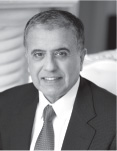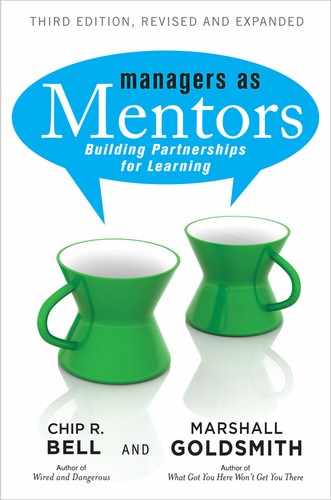24
CASE STUDY
Fly High, Dive Deep
An Interview with Fred Hassan, Managing Director and Partner at Warburg Pincus, LLC

How would you characterize or describe your most important mentor?
My most important mentor was a gentleman who hired me for my first job in the pharmaceutical industry. He was a very senior executive. He was vice president of finance and a very knowledgeable and good person.
What were the traits you found most instrumental to your mentor’s work with you?
First of all, he was caring. He cared to build people around him. He cared to build a team, so the team could also mentor each other. He created this mentoring atmosphere, which was extremely helpful. Secondly, he was very competent. He was always challenging himself and the rest of us to get better at what we were doing. I started my career in corporate planning, which was a very important part of the company. He encouraged us to be open-minded and aggressive with our thinking. As a result of that, I learned to be much more focused on changing things and not accepting status quo as the way to go. Lastly, he was a good friend. He mentored in a very informal style, which was very helpful to me. If someone puts you at ease, is not always trying to impress, then it is easier for the mentoring to occur. The more formal the atmosphere, the less easy it is for the mentoring to occur because then people are more concerned about other matters beyond mentoring.
What is one example or incident or illustration of how this person was helpful to you?
We were at a retreat in the Pocono Mountains in New Jersey in 1973. We were talking about lots of things, including complaining about the hotel, which was not the best. He said that in business life we should be like a seagull, which means you fly high so you can see the environment and the fish, and you also have to be able to dive and get in deep to catch the fish. He emphasized the importance of having the ability to see the big picture, and also get very detailed-oriented and execution-oriented. It was a tremendous comment, which I remind myself of again and again, that I need to be hands-on at times and I need to be conceptual at times. Some people are very good at seeing things, but they don’t get the job done. Others are very focused on getting it done, but they don’t see the right things to do. My mentor taught me that the seagull sees the opportunity and then dives in to capture the opportunity.
What advice or feedback did this person provide that was helpful to you?
My mentor told me that I should play to my strengths. He saw in me a person who was very good at running operations. (At the time I was in a staff function.) The fact that he said this to me meant a lot to me, and after that I accepted a job that went sideways for a while, but in the end was very helpful toward the positions I’ve had where I get to influence and lead people. It started with him saying that I need to play to my strengths. Now when I mentor people or hire them, I ask myself, are they playing to their strengths or will they be playing to their strengths if they get a particular job? We are all good at something; the key is to fit to the right opportunity. A great mentor helps us discover what our strengths are sooner than we might discover them on our own.
